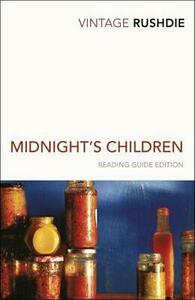Take a photo of a barcode or cover
adventurous
challenging
funny
informative
slow-paced
My favorite book of the year is also the one I have been most intimidated to reflect on. Midnight’s Children is the kind of multi-generational, ostentatious, darkly funny novel that sets the literary agenda for an entire nation. Indeed, India is very much the focus here, and its recent history is explored metaphorically through the life of Saleem Sinai, one of 1,001 “midnight’s children” who were born within the first hour of India’s independence from British rule. Each one is endowed with a supernatural ability, and Saleem is able to create a sort of telepathic radio network between all of them. However, far from embracing the vanguard role it seems he is destined for, Saleem faces lifelong existential anguish at his symbiotic connection with India’s tumultuous development. The schisms and fractions within the government correlate to physical cracks in his skin, a literal body politic. Eventually, ambitions of grandeur give way to his own struggle for independence from fate, no matter how insignificant he becomes as a result. Rushdie’s masterpiece feels every bit as foundational as The Thousand and One Nights or the stories of Jorge Luis Borges (overt influences), but with an extra helping of libidinous and ironic humor. So why am I reluctant to talk about it? Despite its length, everything in Midnight’s Children feels essential, and to attempt to fit its treasures into a blurb or list item seems obscene. Any summary will be woefully inadequate. Rushdie says it best: “To understand just one life you have to swallow the world.”
Saleem Sinai, the protagonist/narrator of Midnight's Children, says this towards the beginning of the book: To understand just one life, you have to swallow the world -- and maybe that's my problem with Midnight's Children.
Approach anything with a Pulitzer/Booker Prize label with caution, as I try to tell myself from time to time, but the double whammy of magical realism and the history of India made me break that rule of thumb. Besides, it's not like I haven't enjoyed Pulitzer/Booker Prize winners in the past (I'm a fan of Margaret Atwood's The Blind Assassin and Yann Martel's Life of Pi). So I gave this a shot and, well, it didn't turn out so well.
Instead of telling the story of Sinai and how his life mirrors that of modern India (since they were born on the same day and at the same time), Senai, as a narrator, would go off to tell the story of every single living member of his family. So we get to hear about his grandfather, grandmother, parents, sister, neighbours, caretakers, cousins, and everybody in between. Sinai was a part of India's history the way Forrest Gump was a part of the US'. But it was a tough book to get through because, whatever that you read in the synopsis, about how a boy is born at the stroke of midnight with telepathic powers and a powerful sense of smell, doesn't actually kick in until about 250 pages into the story.
In short, I can't say it was a bad book, because it obviously isn't. It just isn't my cup of tea, that's all. The characters were strong enough to carry me to about 450 pages, despite the story, and if you are patient enough to sit through Rushdie's ramblings, then this is the book for you.
Approach anything with a Pulitzer/Booker Prize label with caution, as I try to tell myself from time to time, but the double whammy of magical realism and the history of India made me break that rule of thumb. Besides, it's not like I haven't enjoyed Pulitzer/Booker Prize winners in the past (I'm a fan of Margaret Atwood's The Blind Assassin and Yann Martel's Life of Pi). So I gave this a shot and, well, it didn't turn out so well.
Instead of telling the story of Sinai and how his life mirrors that of modern India (since they were born on the same day and at the same time), Senai, as a narrator, would go off to tell the story of every single living member of his family. So we get to hear about his grandfather, grandmother, parents, sister, neighbours, caretakers, cousins, and everybody in between. Sinai was a part of India's history the way Forrest Gump was a part of the US'. But it was a tough book to get through because, whatever that you read in the synopsis, about how a boy is born at the stroke of midnight with telepathic powers and a powerful sense of smell, doesn't actually kick in until about 250 pages into the story.
In short, I can't say it was a bad book, because it obviously isn't. It just isn't my cup of tea, that's all. The characters were strong enough to carry me to about 450 pages, despite the story, and if you are patient enough to sit through Rushdie's ramblings, then this is the book for you.
I think that Slumdog Millionaire will help many become more curious about India. This brilliant book is a must for those searching to understand.
slow-paced
Plot or Character Driven:
A mix
Strong character development:
Complicated
Loveable characters:
Complicated
Diverse cast of characters:
Yes
Midnight’s Children reminds me of my favorite all time book, A Trip to the Stars by Christopher Nicolas. It’s a tale of family, history, adventure, and magic, focused around the central protagonist. It’s a long and complex story, mirroring the growth and development of a child and a country. Beautifully written, with an abundance of fascinating characters. I listened to the Audible version narrated by Lyndam Gregory. No one could have done a better job.
This book is written in the style of magical realism, so if your not a fan of that style then you probably won't enjoy this book. I found the book genuinely funny, but ended on the idea that the story of humanity is a tragic one at heart. I have also now been exposed to more Indian/Pakistani/Bangladeshi history and culture then I can ever hope to fully understand.
Midnight’s children is de omvattende verwerking van Salman Rushdie (1947) van de postkoloniale periode in India. In 1981 won het de Booker Prize, waarna het nog een paar keer zou worden verkozen tot ‘Booker onder de Bookers’. Ik was ervan onder de indruk, al vrees ik dat een deel van de symboliek me ontging.
Het verhaal begint met de geboorte van Saleem Sinai op 15 augustus 1947 om middernacht, het moment waarop India onafhankelijk wordt. Rushdie beschrijft vervolgens in het eerste deel de familiegeschiedenis van Saleem. Daar zitten opmerkelijke verhalen tussen, zoals de ontmoeting van zijn grootouders: omdat oma klachten blijft verzinnen, keert opa als dienstdoend arts telkens terug, al mag hij haar slechts van achter een laken met een gat erin onderzoeken. Vervolgens beschrijft Rushdie in het tweede en derde deel de jonge jaren van Saleem, die samenvallen met de grote gebeurtenissen in India, in het bijzonder de burgeroorlogen waaruit Pakistan en Bangla Desh voortkomen.
Net als 1000 andere kinderen die in hetzelfde uur geboren zijn – een verwijzing naar de verhalen van duizend-en-een-nacht van Sjeherazade – is Saleem begiftigd met een superkracht: hij heeft telepathische vermogens. De krachten zijn zowel een zegen als vloek: als kinderen van de tijd is hun lot verbonden aan dat van het land. Door de hoge mate van magische realteit die Rushdie in zijn historische verhaal verwerkt, is het boek wel vergeleken met [b:One Hundred Years of Solitude|21032147|One Hundred Years of Solitude|Gabriel García Márquez|https://i.gr-assets.com/images/S/compressed.photo.goodreads.com/books/1586182160l/21032147._SY75_.jpg|3295655] van Gabriel García Márquez.
Het taalgebruik van Rushdie is rijk en inspirerend. Eén van de geestigste personages vond ik Padma, die Saleem voortdurend van commentaar voorziet bij het schrijven van zijn memoires. Daarentegen schoot het verhaal te vaak heen en weer, waardoor ik soms de draad kwijtraakte of de significantie van een passage me ontging. De verbinding van het persoonlijk leven van Saleem met de geschiedenis van India is interessant. Toevallig las ik onlangs [b:jl.|36892458|jl.|Anjet Daanje|https://i.gr-assets.com/images/S/compressed.photo.goodreads.com/books/1591608126l/36892458._SY75_.jpg|58653239] van Anjet Daanje, waarin het leven van een Groninger aan de wereldgeschiedenis is gekoppeld.
Dit jaar won [b:The Seven Moons of Maali Almeida|57224204|The Seven Moons of Maali Almeida|Shehan Karunatilaka|https://i.gr-assets.com/images/S/compressed.photo.goodreads.com/books/1658847734l/57224204._SY75_.jpg|89565815] van de Sri Lankese schrijver Shehan Karunatilaka de Booker Prize; de International Booker ging naar [b:Tomb of Sand|58703758|Tomb of Sand|Geetanjali Shree|https://i.gr-assets.com/images/S/compressed.photo.goodreads.com/books/1628126156l/58703758._SY75_.jpg|92372547] van de Indische Geetanjali Shree. Mede dankzij Rushdie heb ik zin me aan die werken te wagen.
Het verhaal begint met de geboorte van Saleem Sinai op 15 augustus 1947 om middernacht, het moment waarop India onafhankelijk wordt. Rushdie beschrijft vervolgens in het eerste deel de familiegeschiedenis van Saleem. Daar zitten opmerkelijke verhalen tussen, zoals de ontmoeting van zijn grootouders: omdat oma klachten blijft verzinnen, keert opa als dienstdoend arts telkens terug, al mag hij haar slechts van achter een laken met een gat erin onderzoeken. Vervolgens beschrijft Rushdie in het tweede en derde deel de jonge jaren van Saleem, die samenvallen met de grote gebeurtenissen in India, in het bijzonder de burgeroorlogen waaruit Pakistan en Bangla Desh voortkomen.
Net als 1000 andere kinderen die in hetzelfde uur geboren zijn – een verwijzing naar de verhalen van duizend-en-een-nacht van Sjeherazade – is Saleem begiftigd met een superkracht: hij heeft telepathische vermogens. De krachten zijn zowel een zegen als vloek: als kinderen van de tijd is hun lot verbonden aan dat van het land. Door de hoge mate van magische realteit die Rushdie in zijn historische verhaal verwerkt, is het boek wel vergeleken met [b:One Hundred Years of Solitude|21032147|One Hundred Years of Solitude|Gabriel García Márquez|https://i.gr-assets.com/images/S/compressed.photo.goodreads.com/books/1586182160l/21032147._SY75_.jpg|3295655] van Gabriel García Márquez.
Het taalgebruik van Rushdie is rijk en inspirerend. Eén van de geestigste personages vond ik Padma, die Saleem voortdurend van commentaar voorziet bij het schrijven van zijn memoires. Daarentegen schoot het verhaal te vaak heen en weer, waardoor ik soms de draad kwijtraakte of de significantie van een passage me ontging. De verbinding van het persoonlijk leven van Saleem met de geschiedenis van India is interessant. Toevallig las ik onlangs [b:jl.|36892458|jl.|Anjet Daanje|https://i.gr-assets.com/images/S/compressed.photo.goodreads.com/books/1591608126l/36892458._SY75_.jpg|58653239] van Anjet Daanje, waarin het leven van een Groninger aan de wereldgeschiedenis is gekoppeld.
Dit jaar won [b:The Seven Moons of Maali Almeida|57224204|The Seven Moons of Maali Almeida|Shehan Karunatilaka|https://i.gr-assets.com/images/S/compressed.photo.goodreads.com/books/1658847734l/57224204._SY75_.jpg|89565815] van de Sri Lankese schrijver Shehan Karunatilaka de Booker Prize; de International Booker ging naar [b:Tomb of Sand|58703758|Tomb of Sand|Geetanjali Shree|https://i.gr-assets.com/images/S/compressed.photo.goodreads.com/books/1628126156l/58703758._SY75_.jpg|92372547] van de Indische Geetanjali Shree. Mede dankzij Rushdie heb ik zin me aan die werken te wagen.
What an amazing book - funny, amazing writing, intriguing, shocking, magical, epic. Basically a cross between a Hundred Years of Solitude and Forrest Gump
challenging
reflective
slow-paced
Plot or Character Driven:
Character
Strong character development:
Complicated
Loveable characters:
No
Diverse cast of characters:
Yes
Flaws of characters a main focus:
No




